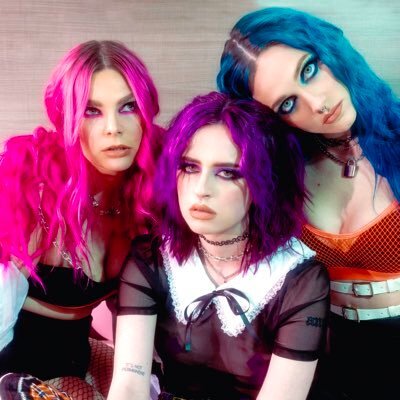TRAMP STAMPS and the Issue with Calling Artists an 'Industry Plant'
Image courtesy of TRAMP STAMPS Twitter // @trampstamps
If you happen to find yourself on the “alternative” side of TikTok, you will probably see the controversy surrounding the band TRAMP STAMPS, a pop-punk trio from Nashville who have amassed almost 400,000 followers on the social media platform since February 2020. As they gained popularity, however, they also garnered controversy, the initial claims being that the three women are an “industry plant.”
An industry plant is commonly defined as “an artist who has a major/indie label backing their movement but presents themselves as a ‘home grown start up’ label to create a pseudo organic following,” according to Medium.com. Using Tramp Stamps as an example, they are being accused of fabricating their “pop-punk” aesthetic to gain notoriety, following the sudden resurgence of the genre in pop music today. The discourse regarding the band on TikTok has criticized everything about the band’s image, from their choice of dress, to their lyrics, to the color of their hair - all under the guise that Tramp Stamps are not as “punk” as they claim to be.
The issue with industry plants is that there is manipulation from both the artist and the management, forcing fans to question if the music they are listening to is coming from a genuine place, or if they are being sold what record labels expect people to like. With a genre like punk, the subculture is so rooted in the morals of individuality and self-autonomy that any threat posed diminishes the value that the culture holds.
Take what is perhaps one of the most widely disputed “industry plants” of all-time: the Sex Pistols. Now I will say, I still love the Sex Pistols’ music. Their aesthetic and attitude have come to define punk in popular culture and, whether one wants to admit it or not, their songs have become classic anthems in the genre. The Sex Pistols were seen as a brazen anarchist group, with singer Johnny Rotten shouting about their disdain for the government and conformity while the band caused a scene everywhere they went. Their looks complimented their unwavering attitudes: leather jackets, ripped knit sweaters, combat boots and disheveled hair. n quintessential punk fashion, following the release of their only album Nevermind the Bollocks, Here’s the Sex Pistols!, the band split up and never made music together again - only adding to the mystique they had cultivated for themselves.
When I was first discovering punk for myself, I thought the Sex Pistols were the coolest band to ever exist. I loved their no-fucks-given attitude and their angst-filled songs, along with the whole “Damn the man!” persona, too. Learning later on that the band was essentially manufactured invalidated a lot of what I believed the Sex Pistols symbolized. Notorious band manager Malcolm McLaren stole the attitudes, looks and sounds of the original downtown New York punks and modelled the members of the Sex Pistols after them, signing them to a label and creating media buzz leading up to the release of their LP.
The discourse surrounding whether or not the Sex Pistols are a “real” punk band has spanned over the last four-and-a-half decades since Nevermind the Bollocks debuted in 1977. On paper, the band fits all the parameters of punk in their presentation. Yet, when pitted against the originators of punk - the Ramones, Iggy Pop & the Stooges, the New York Dolls, etc. - it is clear that the Sex Pistols are a commodified version of what a “punk” is thought to be.
This has carried into the pop-punk genre in contemporary music, leading to bands like TRAMP STAMPS attempting to break into the mainstream. The genre’s infusion of “pop” and “punk” alone is subject to criticism from fans of the respective cultures. WIth its rise in the 1990s, pop punk became the genre for artists to gravitate towards if they wanted to be successful - and suddenly, bands were modelling themselves after the Sex Pistols. In pop punk’s current comeback, we have musicians like Machine Gun Kelly, MOD SUN, and WILLOW transitioning to the archetypal guitars and aesthetics that made punk so popular in the first place. Artists such as these have been met with a slew of criticism, though, for their sudden change in sound. Is this coming from a place of genuine artistry, or are fans valid in their fear of being solely marketed towards, once again?
The “industry plant” has pervaded the music industry over the years, so much so that the label has been misconstrued and thrown around to an extent where virtually any artist is at risk of being called a “plant.” There is a difference between a musician’s transition between or within genres, and an outright mockery of a subculture by means of garnering attention and fanfare. Inauthenticity is also a root of the problem here: fans want to feel that the music they listen to is coming from a real source of emotion, not just something that is made to make them talk and spend their money.
The real issue, ultimately, is not with the artists who are being marketed within certain subcultures. While the criticism of an “industry plant” may come from a place of genuine questioning and disappointment, the invalidation of an artist’s work is often met with unprecedented discrimination and can lead to intense public scrutiny. Instead, let’s consider the fault of the industry for feeling the need to manufacture artists in the first place. In such a consumer-driven society, the music industry’s inclination to capitalize on a genre’s appeal takes away any validity it may have had, and admittedly, makes contemporary music feel stale and repetitive. Artistic integrity should be held at a much higher standard than the desire for fame or wealth, and music fans hold the power to dictate this narrative in favor of music that is honest and truly impactful.

